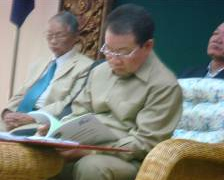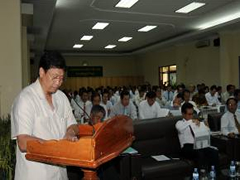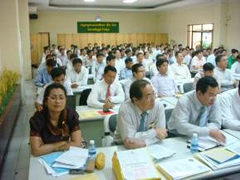Project News
2011-10-19
QCAM Project & Public-Private Partnership
The Project of Capacity Building for Quality Standard Control of Agricultural Materials (Chemical Fertilizers and Pesticides) (QCAM Project), implemented Technical Information Exchange Programs (TIEP) three times at the Fertilizer and Pesticide Authority (FPA) of the Department of Agriculture (DA) in the Philippines. The FPA is one of the implementation partners of the project, and has dispatched experts to the Department of Agricultural Legislation (DAL) and the General Directorate of Agriculture (GDA) in the Ministry of Agriculture, Forestry and Fisheries (MAFF). The main purposes of the TIEPs were to learn administrative procedures, which included the registration of chemical fertilizers and pesticides and post-registration work in the FPA.
During the TIEPs, the Cambodian CP staff were able to learn another valuable lesson related to the importance of proper management of agricultural materials in cooperation with the private sector, which has professional knowledge and resources in these technical areas. There have been two major contributors to the success of the TIEPs. In addition to the FPA, a great contribution has been made by Professor Francisco Cornejo, who is a former executive director of the FPA. Professor Cornejo worked in Cambodia short-term as an expert on the review of administrative work for chemical fertilizers and pesticides from October to December, 2009.
When he was working as an expert for the QCAM Project, Professor Cornejo recognized that there was a lack of cooperation between the MAFF and the private sector in the management of the agricultural materials. After completing his mission in Cambodia and returning to the Philippines, Professor Cornejo continued to be involved in planning the TIEPs with the FPA to solve that issue for the QCAM Project. He also organized several meetings for the Cambodian CP staff with manufacturers and distributors of chemical fertilizers and pesticides, so that the CP staff can effectively learn about the importance of collaboration with the private sector in the management of agricultural materials. As a result, the CP staff were able to recognize the importance of cooperating with the private sector to implement awareness-raising activities on the proper use of the agricultural materials for farmers and retailers, as is the case in the Philippines.
 H.E. Chan Sarun, Minister of the MAFF, reading the "Guide Book for Pest Management" of the QCAM Project in the opening ceremony of the seminar on information and trader's obligations on agricultural materials.
H.E. Chan Sarun, Minister of the MAFF, reading the "Guide Book for Pest Management" of the QCAM Project in the opening ceremony of the seminar on information and trader's obligations on agricultural materials.
In Cambodia, there has not been any manufacturer of chemical fertilizers and pesticides. These products have been imported, mainly from neighboring countries like Thailand and Vietnam. As a result, there was no close cooperation between the MAFF and the distributors of the agricultural materials, which is against the case in the Philippines. At the same time, the concept of "Corporate Social Responsibility" was not yet familiar among most people in the government or the private sector, which is different from the case in developed countries like Japan. In spite of this challenging situation, the DAL organized a seminar titled "Information and Traders' Obligations on Agricultural Materials" for traders of agricultural materials on October 12th, 2011. The seminar explained to the traders about their duties in managing the agricultural materials, and finally proposed they establish Cambodia Agricultural Materials Traders Association (CAMTA), based on the ideas learned through the TIEPs in the QCAM Project. In addition, the QCAM Project distributed the "Guide Book for Pest Management" to all the participants in that seminar. Subsequently, most traders supported the proposal and agreed to take the necessary steps to establish the CAMTA.
Ultimately, all project staff including the CP staff and the JICA experts, were very satisfied and felt confident that the CP staff were able both to adapt what they had learned in the QCAM Project to their local Cambodian situations, and to have started to implement it by themselves. Although much effort must be still made to officially establish the CAMTA by all stakeholders, we sincerely hope that that this will be done as soon as possible. Then the government, the private sector, and the Cambodian people, will be able to achieve a safe and peaceful society by working together for the proper management of agricultural materials.
 Mr. Ouk Syphan, Director of the DAL, presenting the establishment of the CAMTA in the seminar.
Mr. Ouk Syphan, Director of the DAL, presenting the establishment of the CAMTA in the seminar.
 Participants in the seminar.
Participants in the seminar.
Written by Toshinori Hamaguchi, JICA Expert
- About JICA
- News & Features
- Countries & Regions
- Our Work
- Thematic Issues
- Types of Assistance
- Partnerships with Other Development Partners
- Climate Change / Environmental and Social Considerations
- Evaluations
- Compliance and Anti-corruption
- Science and Technology Cooperation on Global Issues
- Research
- JICA Development Studies Program / JICA Chair
- Support for the Acceptance of Foreign HRs / Multicultural and Inclusive Community
- Publications
- Investor Relations
